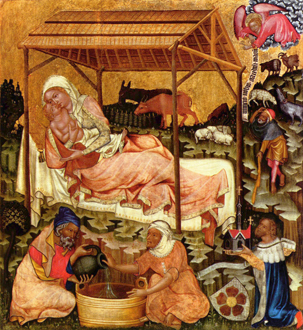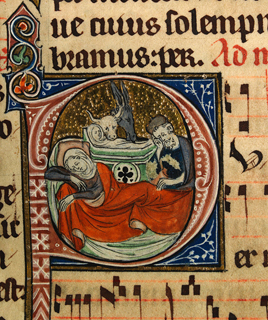From Our Archive
Joan Roughgarden, Bringing Heaven to Earth Here and Now (2007); Dan Clendenin, Before and After (2010); Melissa Early, Wake Up! (2016); Debie Thomas, Like a Thief (2019).
For Sunday November 27, 2022
The First Sunday in Advent
Lectionary Readings (Revised Common Lectionary, Year A)
Isaiah 2:1-5
Psalm 122
Romans 13:11-14
Matthew 24:36-44
This Week's Essay
A guest essay by Amy Frykholm (PhD, Duke University). Amy is an award-winning writer, scholar, and journalist whose nonfiction works cover the territory of American religion from apocalyptists to saints. A senior editor for The Christian Century magazine, she hosts a podcast called In Search Of, which we happily feature on our home page here at JWJ. Her books include Rapture Culture: Left Behind in Evangelical America, Julian of Norwich: A Contemplative Biography, Wild Woman: A Footnote, the Desert, and My Quest for an Elusive Saint, and her new book of poetry, The Hour of Light (2022).
Lately I’ve been trying out a new discipline: reading the news without engaging in speculation about the future. I’ve been curious about how much of my daily news intake is not about what has happened, but various predictions about what might happen. As far as my new awareness indicates, my own news-reading routines are full of predictions: weather predictions, election predictions, economic predictions. Who will say or do what. What it will mean.
I’m aware of how attractive these predictions are to me. I almost always heedlessly give a part of my morning to participating in this collective project of predicting the future, for good or for ill, right or wrong. It is almost as though I am trying to replace faith with a false mastery of the future. Given the number of these articles in the various news media that purport to know the future, I am guessing I am not alone.
We tell ourselves these stories about the future because they allow us to imagine that we can prepare, that we know what’s coming, that if we only analyze the future rightly, we can create viable safety plans. The bigger the predicted catastrophe, the greater we imagine that just by knowing it is coming, we can avoid its most adverse effects. In other words, we use predictions about the future to try to escape the basic vulnerability of being human.
But Advent is a time in the Christian tradition when we acknowledge that even as we anticipate something we know is coming — the Word, incarnate — we can't comprehend it.
Matthew 24 for this week asks us to see the coming of the Son of Man through the eyes of people living at the time of Noah. They were just going about their lives, the passage says. They were doing ordinary things — the things that you and I do. They were eating and drinking, acting as if they had a future, making plans for that future.
If we go back to the story of Noah from Genesis, we know that things in those days weren’t exactly ordinary. God had become so distressed and so saddened by the destruction and decay of creation that God had decided to destroy the earth completely. What the people took to be their ordinary lives was in fact a state of extreme itzavon — alienation.
 |
|
Medieval miniature of the Nativity by the Master of Vyšší Brod, c 1350.
|
This state of alienation — present from the time of Adam — had become intolerable to God. Alienation from any divine conversation, alienation from the land, alienation from each other: the conversation of which humans were meant to be a part, a conversation that involves heaven and earth, had almost entirely disappeared. The Biblical commentator Avivah Gottlieb Zornberg writes that this alienation had “intensife[d] to the point where it [became] unbearable [and] the disappointing world project [was] obliterated.”
When Jesus refers back to this passage in Genesis, he seems to suggest that his listeners haven’t learned much from the time of Noah. And it wouldn’t be hard for us to make a similar argument today that we’re still going about our business in the same way, as if we had some claim on the future.
Jesus points to a particular characteristic of the people of Noah’s time: their state of unknowing. Unknowing is not the same thing as uncertainty. All human lives have uncertainty, but acknowledgement of uncertainty can bring heightened awareness, heightened presence. Unknowing, as it is imagined in this passage, is more like being in a fog — the fog that ordinary life brings. This unknowing, this lack of perception, even, we might say, this lack of attention, lasts until the kataklismos sweeps the people away. You are just going about your business — checking your email or grinding your grain, as the case may be — completely unprepared for what is to come.
Jesus suggests that the answer to what plagued the people of Noah’s time and even us today is the quality of “being on the alert” or being “ready.” In order to do that, we have to accept that the true future — the coming of the Lord — is so obscured, so hidden in the mind of God, that no one knows anything about it — except God. The Son of Man doesn’t know; the angels don’t know (Matthew 24:36).
Furthermore, God is not safe. God is imagined as no less than a thief, breaking into our houses. I’ve always found this a little bit funny, like it might be a joke about our human natures: if you knew when God was coming, you sure as heck would build up your defenses. We’d rather live in the fog of the ordinary than meet God in the uncertain. But acceptance of uncertainty prevents us from building up our defenses; it increases rather than decreases our vulnerability.
“For this reason,” Jesus says, “be ready.” What does it mean to be ready? Ready to meet God at the door with a baseball bat? Endlessly reading the news hoping to finally master the future? Up all night with our fears and anxieties eating us alive? Chewing on the future until our stomachs turn acid?
I wonder if the alternative is something like what the poet Ross Gay describes in his recent book Inciting Joy (2022). He writes about how important it is, in the pursuit of joy, not to lock ourselves up against sorrow. He writes, “I am advocating, and adamantly so … that we lay down our swords and invite sorrow in. I’m suggesting we make sorrow some tea from the lemon balm in the garden… We give sorrow our dad’s slippers that we’ve hung on to for fifteen years for just this occasion. And we drape our murdered buddy’s scarf, still smelling of nag champa, over sorrow’s shoulders, to warm them up some. We wedge some wood in the fire. As we’re refilling their tea we notice sorrow is drinking from a mug given to us by someone we’ve hurt.”
 |
|
The Nativity depicted in an English liturgical manuscript, c.1310-1320.
|
For a moment, imagine inviting the God of the future in, as Gay imagines inviting sorrow. Replace the word “sorrow” with the word “God” and see what difference it makes. Let’s lay down our swords and invite God in. Let’s make God some tea from the garden’s lemon balm and give God our dad’s slippers. Let’s drape our murdered buddy’s scarf around God’s shoulders and wedge some wood in the fire. Let’s notice that God is drinking from a mug given to us by someone we’ve hurt.
In other words, as we begin to invite God in, perhaps we begin to overcome the condition of itzavon. We restart conversations we’ve ended. We remember things we had forgotten or repressed. We acknowledge what we’ve lost and what life has cost us, but even as we acknowledge that, we also extend ourselves forward. We become awake to the complexity and grace of the moment as we forgive God the intrusion into our well-planned worlds.
This is perhaps what Advent is for in the Christian tradition: for the practice of being ready to welcome God at each and every moment, dismantling our defenses, becoming aware of the moment’s possibilities, and using the opportunity to become awake to the grace of the ordinary.
Weekly Prayer
David A. Redding, from If I Could Pray Again (1965)
O Lord,
Let Advent begin again
In us,
Not merely in commercials;
For that first Christmas was not
Simply for children,
But for the
Wise and the strong.
It was
Crowded around that cradle,
With kings kneeling.
Speak to us
Who seek an adult seat this year.
Help us to realize,
As we fill stockings,
Christmas is mainly
For the old folks —
Bent backs
And tired eyes
Need relief and light
A little more.
No wonder
It was grown-ups
Who were the first
To notice
Such a star.
Dan Clendenin: dan@journeywithjesus.net
Image credits: (1) Wikipedia.org; and (2) Wikipedia.org.





